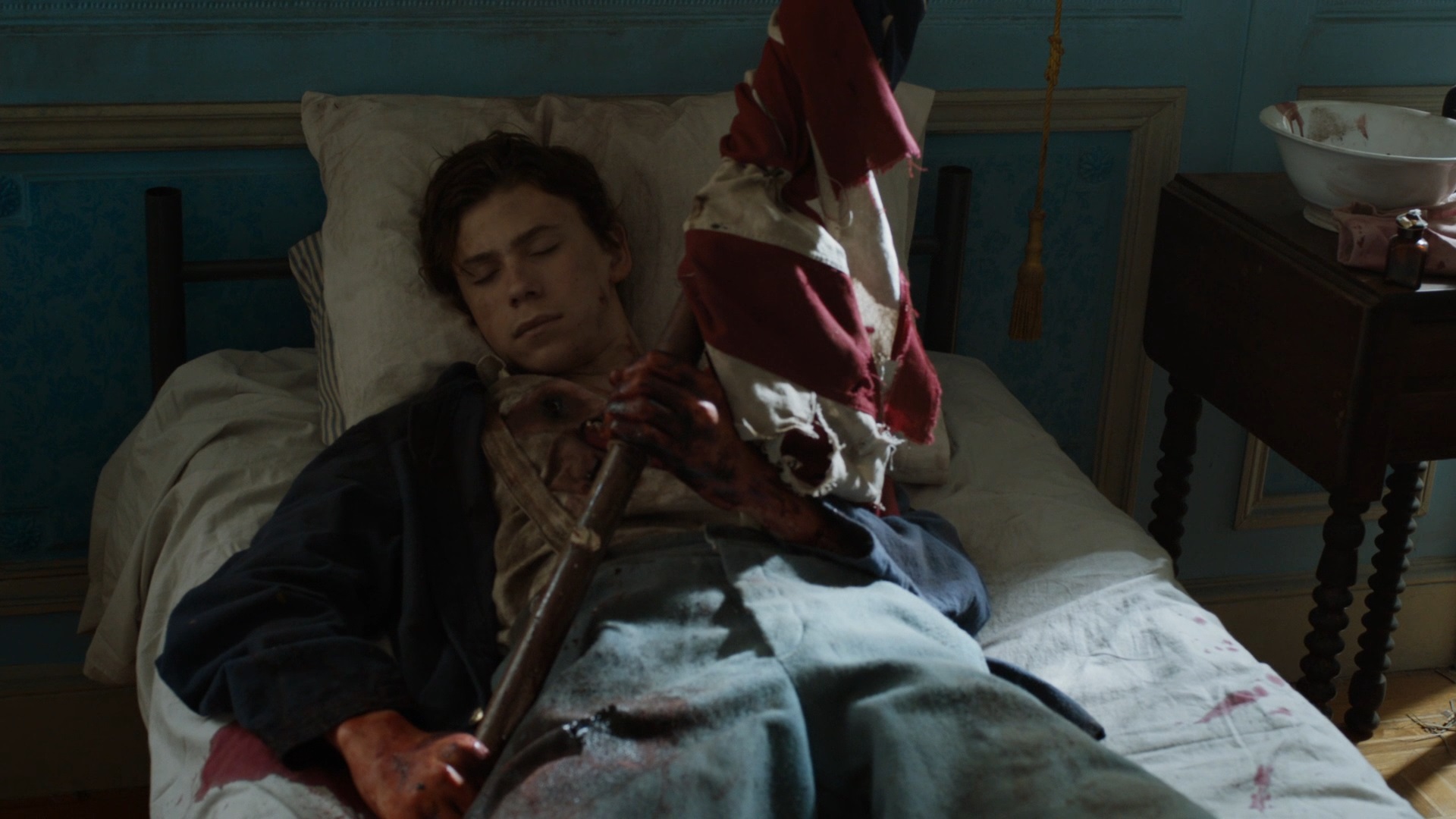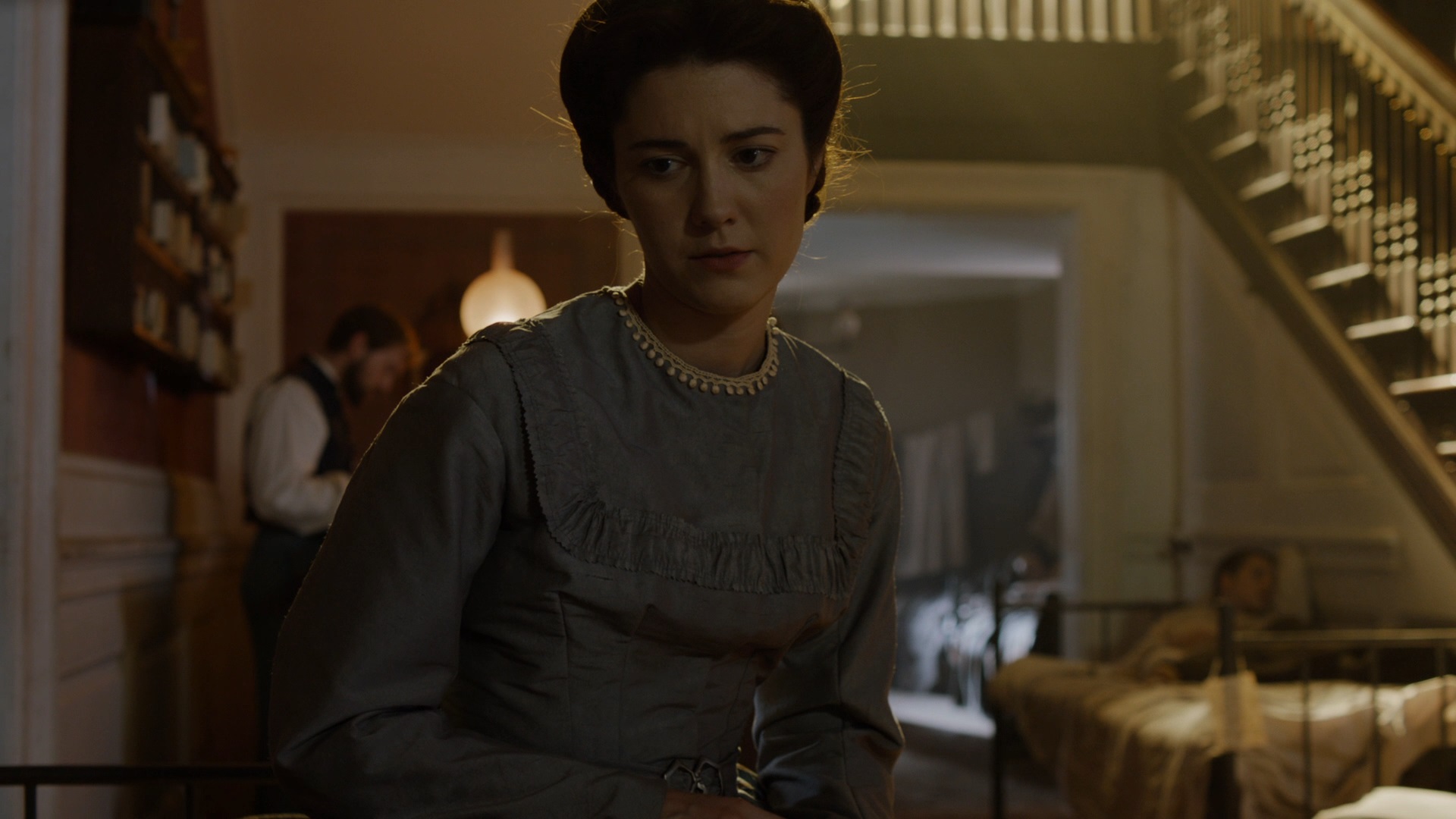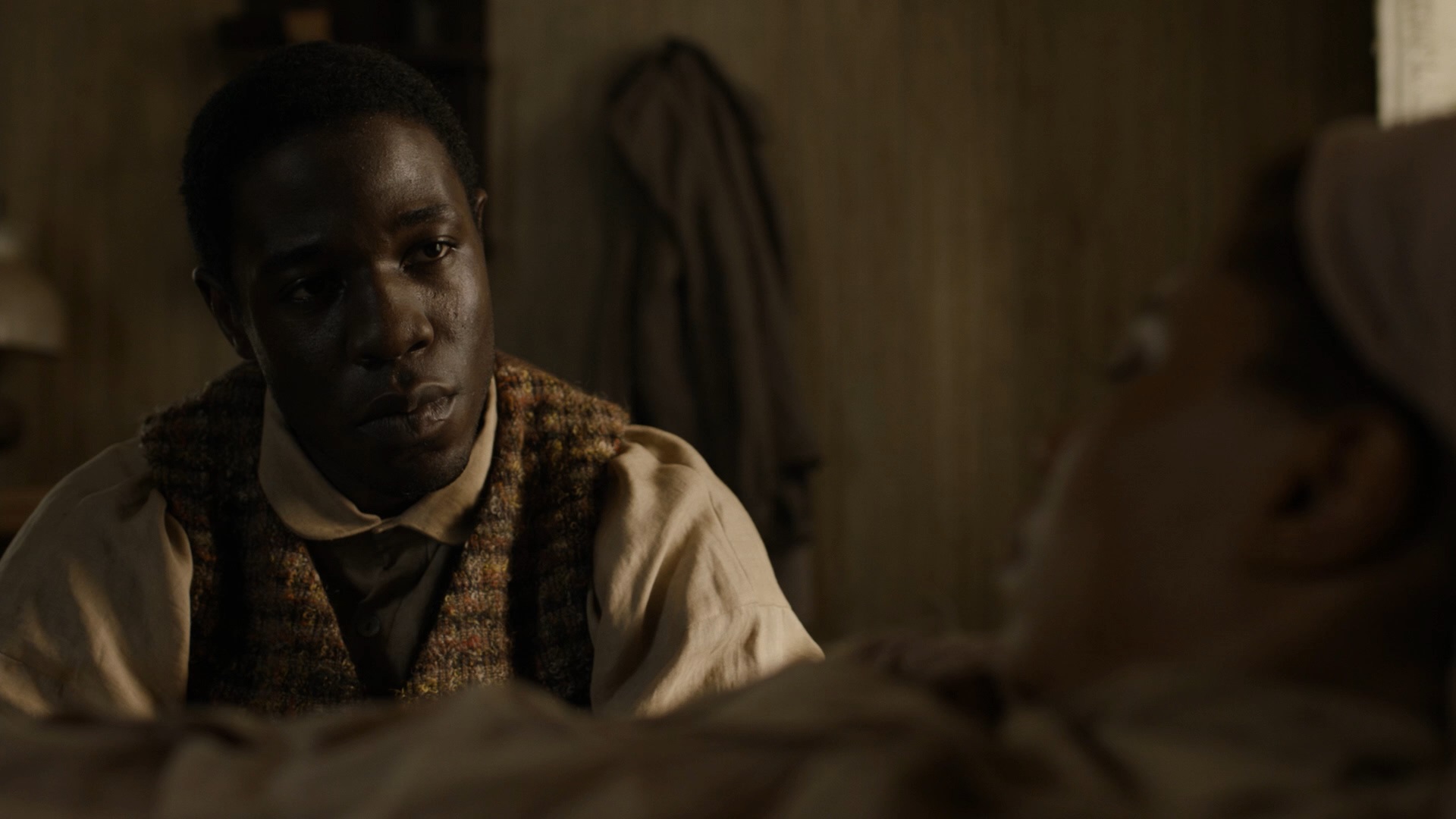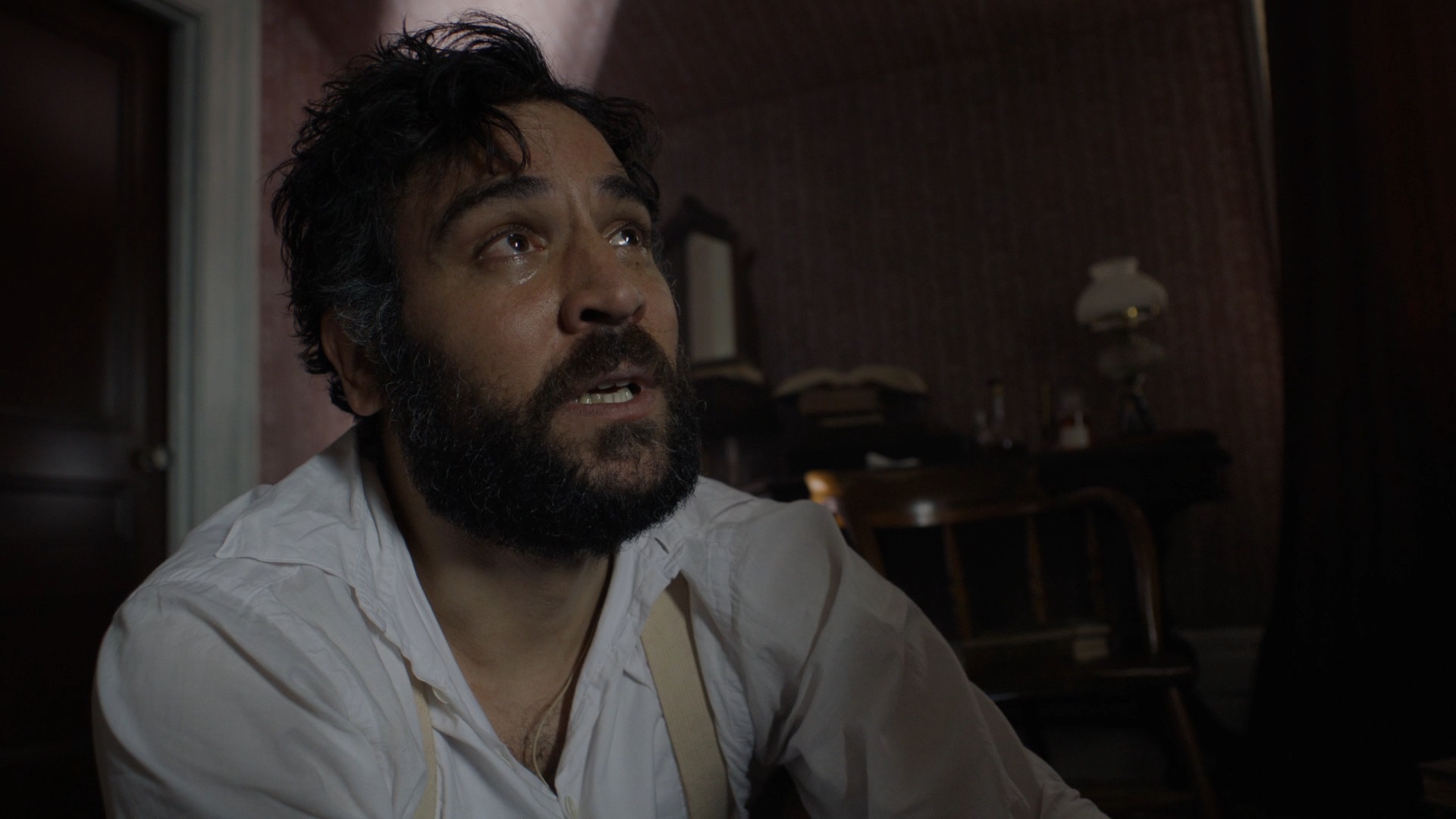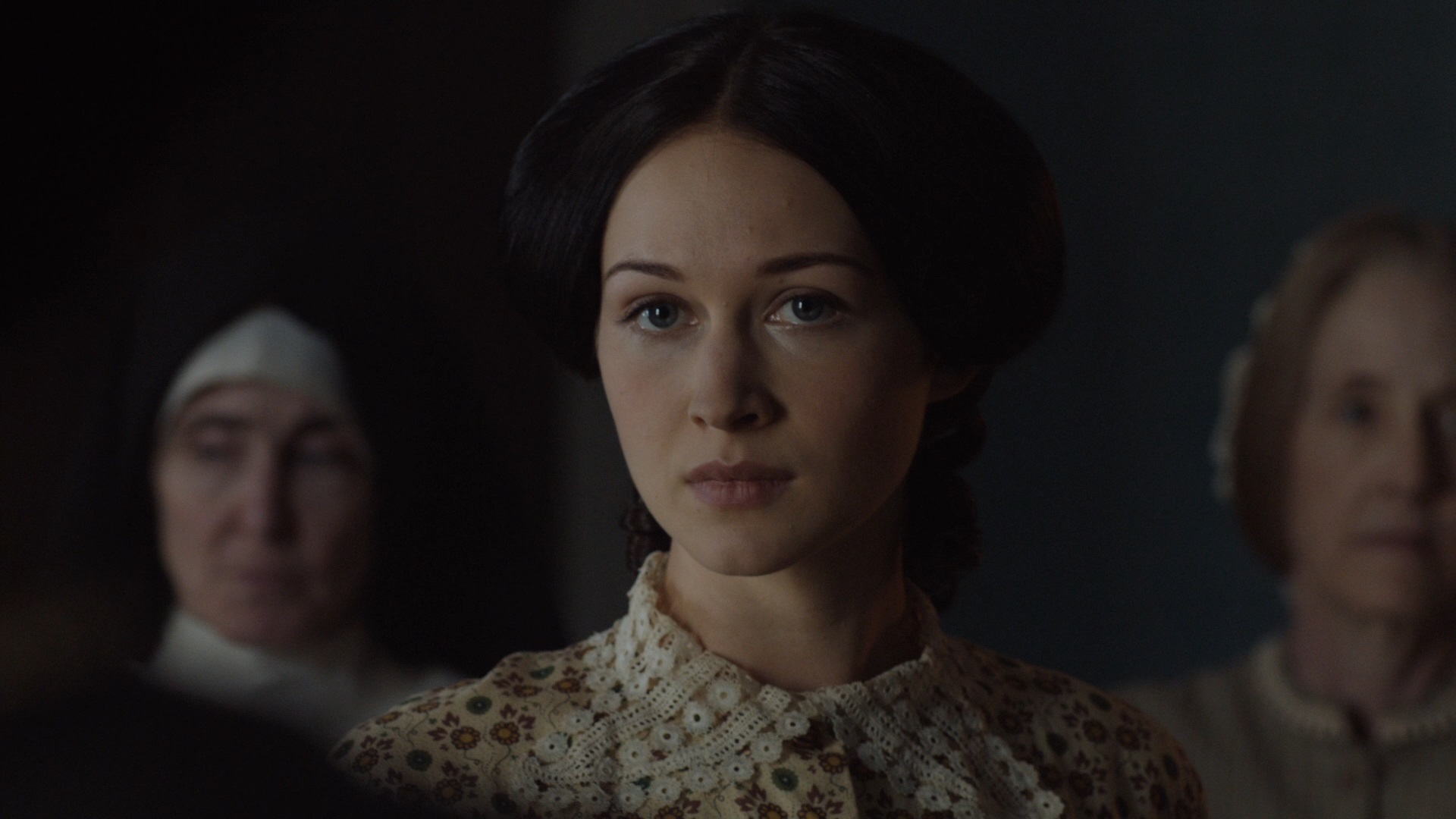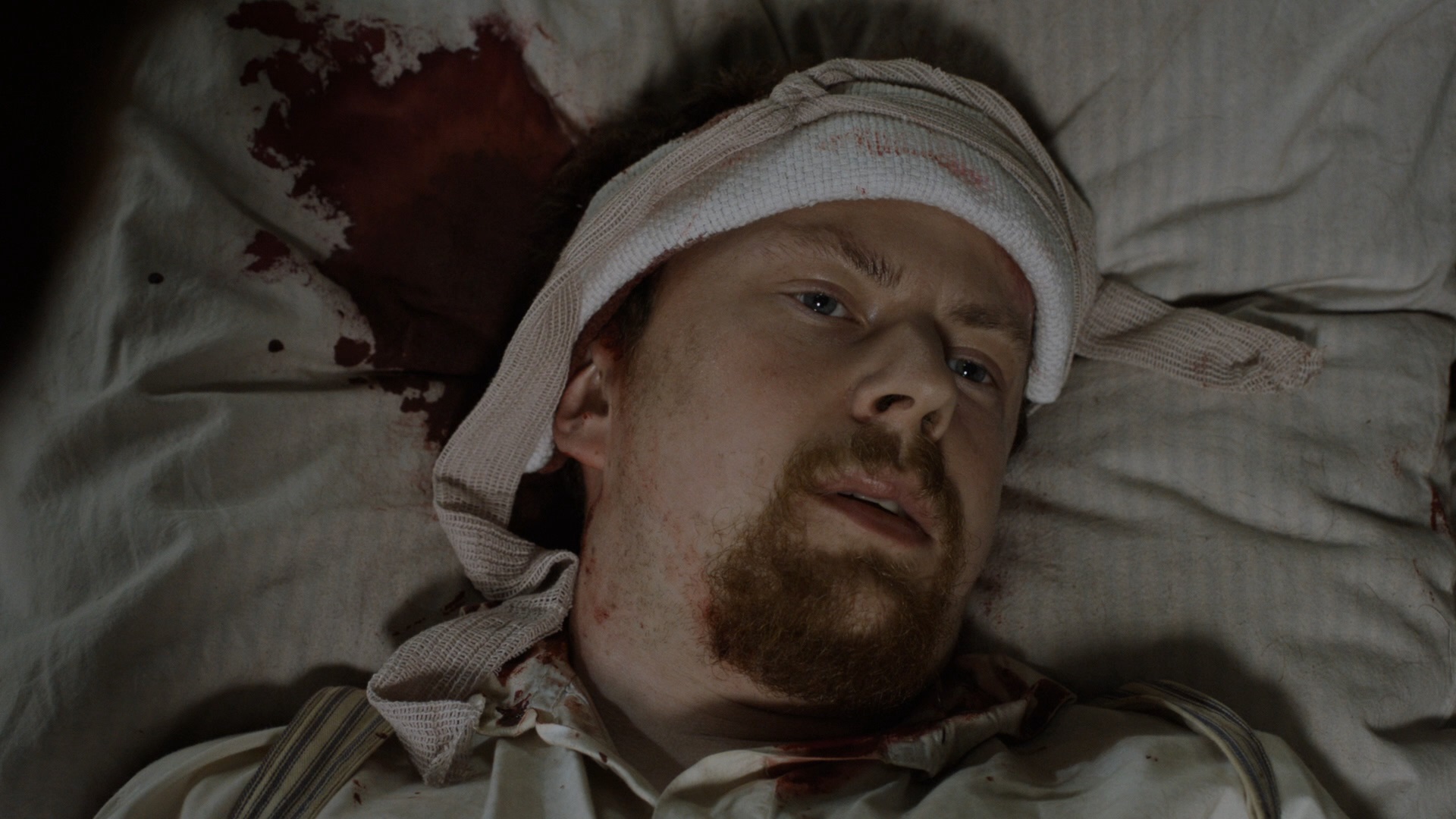| Reviews & Columns |
|
Reviews DVD TV on DVD Blu-ray 4K UHD International DVDs In Theaters Reviews by Studio Video Games Features Collector Series DVDs Easter Egg Database Interviews DVD Talk Radio Feature Articles Columns Anime Talk DVD Savant Horror DVDs The M.O.D. Squad Art House HD Talk Silent DVD
|
DVD Talk Forum |
|
|
| Resources |
|
DVD Price Search Customer Service #'s RCE Info Links |
|
Columns
|
|
|
Mercy Street
PBS // Unrated // February 2, 2016
List Price: $44.99 [Buy now and save at Amazon]
More than a decade has passed since PBS last produced an original scripted drama all its own. The landscape has changed dramatically throughout those intervening years, and the six-part Civil War drama Mercy Street is PBS' attempt at showing that public television can stand tall with the best of them, boasting lavish production values, a talented cast of familiar faces, and even Ridley Scott's name above the title.
Mercy Street has its roots in history, set in a commandeered hotel-turned-hospital on the border dividing North from South. The series is anchored around two nurses that volunteer to care for the wounded at Mansion Street Hospital. Despite having no formal training, Mary Phinney (Mary Elizabeth Winstead) nursed her husband at their home in Boston throughout his final days, and the recently widowed baroness heads south towards Alexandria in search of a new purpose. The staff at Mansion Street bristle at both of her titles -- baroness and head nurse -- as she's thrust into the unrelenting chaos of a wartime hospital. Resources are scarce, and the staff is harried enough trying to care for their boys; this is, after all, a Union hospital. But what of the neglected Confederate soldiers that lay near death? Who's to comfort and care for them? Emma Green (Hannah James) is hardly a nurse by trade -- in fact, her wealthy, prestigious family owned Mansion Street until the war broke out -- but she sets aside her petticoat when a visit to the hospital reveals her true calling.
The ensemble of Mercy Street is so sprawling that a complete list would easily double the length of this review. Mary is condescended towards at every turn by more seasoned nurse Anne Hastings (Tara Summers), who seizes any available opportunity to mention that she once toiled alongside Florence Nightingale during the Crimean War. Anne schemes with Dr. Hale (Norbert Leo Butz) about how to best advance his career, which proves to be more of a concern of his than providing adequate medical care. While Hale's methods are antiquated to the point of being almost savage, the civilian Dr. Jed Foster (Josh Radnor) instead embraces largely unproven techniques he'd acquired overseas. If you're curious who he studied under and whether or not those colleagues hail from France, worry not; Dr. Foster will make it a point to tell you. Samuel Diggs (McKinley Belcher III) is every bit as gifted as the majority of Mansion Street's doctors, benefiting from an unofficial apprencticeship under a Pennsylvanian surgeon. Nevermind that this is now Union territory; Sam is black, and that means he can only contribute his talents in secret. Sam is taken with a 'contraband' -- an escaped slave -- named Aurelia (Shalita Grant) who's wielding a great many secrets she can't bring herself to reveal. Too many of those secrets are in some way connected with the hospital's thieving steward (Wade Williams), who rifles through soldiers' care packages and hoards the best supplies for himself rather than bother to adequately feed any of the patients.
Mercy Street divides its attention between the Mansion Street Hospital and its former owners, the Green family. Patriarch James Green, Sr. (Gary Cole) struggles to maintain his family's waning wealth and influence under Union occupation while still remaining loyal to the Confederacy. It's a delicate balancing act that grows more challenging with each passing day as he continually sidesteps taking a loyalty oath. James' son (Brad Koed) shares his name but not his methods. Repulsed by his father's wheeling and dealing yet physically unable to march onto the battlefield, the brash James, Jr. wants to take the fight to these Northern aggressors however he can. Eldest daughter Emma has, as mentioned earlier, embraced an unexpected, newfound role as a Confederate nurse at a Union hospital. Her innocent, bright-eyed sister Alice (AnnaSophia Robb) doesn't wield such strength, reeling at how the war has transformed her former beau (Cameron Monaghan). Emma first stepped foot in the hospital in search of her own love. Though Frank Stringfellow (Jack Falahee) is nowhere to be found there, this wily boy soon re-enters Emma's life, doggedly supporting the Confederacy in a way she could never have expected.
With such a seemingly endless list of characters and the many subplots that connect them, Mercy Street has quite a lot to accomplish in the space of just five and a half hours. The strength of the cast contributes immensely to this, talented enough to take even a small moment and elevate it into something greater. Mary Elizabeth Winstead is outstanding as Mary Phinney, radiating unmistakeable strength and resolve in the face of such adversity while still remaining human. Shock and horror do seize hold but never for more than an instant, as the vulnerability so visible in her eyes quickly fades to make way for the work that must be done. Winstead offers a perfect blend of warmth, humanity, and steadfast determination, and Mercy Street could not have found a more engaging actress to take the lead. Despite not having quite as prominent a role, I'm every bit as impressed by McKinley Belcher III. Sam is, to my mind, Mercy Street's most intriguing, compelling, and deeply layered character, and Belcher's arresting performance ensures that I will keep an eye out for any project he's attached to in the future. Sam contributes greatly to one of the most engaging aspects of the series: the exploration of race relations in the Civil War era. Two former slaves -- contraband Aurelia and the Greens' dedicated slave-cum-servant Belinda (L. Scott Caldwell) -- are an inherent part of some of Mercy Street's most remarkable moments.
Focusing on the series' greatest strengths, I appreciate that Mercy Street doesn't divide the Union and Confederate soldiers into heroes and villains. For instance, those hailing from the North make unforgiveable decisions, such as returning runaway slaves to their owners -- or allowing the kidnapping of free blacks to slave states -- despite slavery supposedly having been exorcised from Alexandria. These soldiers, regardless of their loyalty, are men, and the series takes care to treat the few with whom we become closely acquainted as individuals. Even Mary and Dr. Foster soon discover they're not nearly as enlightened as they think they are. Another recurring theme is the nature of freedom and what it represents. Is it better to have a home and receive a certain level of treatment even if it means you're still technically someone else's property? Is it worth it to be able to say you're free if you don't know where your next meal is coming from? What does freedom mean for a former slave who decides to stay with the people who once owned him or her? Mercy Street doesn't pretend that there are any easy answers, and this is something quite a few of its characters are forced to consider. As anyone watching a Civil War drama on PBS is almost certainly aware, a hospital could pose as much danger in those days as a battlefield. Mercy Street does not avert its eyes from the abominations of war or from the state of medicine in the mid-nineteenth century. These procedures are indescribably grueling and visceral, unleashing more blood, gore, and astonishingly realistic effects work than most horror movies can claim. This is not a series for the faint of heart. This extends beyond its graphic imagery into murder, abortion, rape, suicide, and post-traumatic stress disorder. Mercy Street tempers this with splashes of humor and teases of romance, and these elements are melded in deftly enough that there's never any tonal whiplash.
Mercy Street's ambition is as often a curse as it is a blessing, particularly the enormity of the cast limiting how much time can be devoted to each individual character. This leaves some woefully underserved. The steward, Silas Bullen, is a straightahead villain who's not merely devoid of any redeeming qualities, but is such a cancer in the hospital -- hoarding, stealing, and reselling supplies; feeding the soldiers and staff alike little, if anything -- that his continued presence is inexplicable. I appreciate the playful and not entirely effective scheming of Nurse Hastings and Dr. Hale, although the black-and-white nature of Hale and Foster's differences comes as somewhat of a disappointment. I wish there were more nuance, with some merit shown to each man's methods as well as some calamitous consequences. As much as I love Butz' performance, Hale is the misguided, self-serving, generally incompetent antagonist, while Foster is the maverick who puts his patients first, even if the necessary treatments break from convention. Mercy Street attempts to keep things more even-keeled with Foster's precarious self-medication, but it's a subplot that doesn't resonate the way it's meant to, especially given the limited runtime of this miniseries. The understaffed hospital is deprived of one of its chief talents for something like a week and a half, and hardly anyone seems to pay it any notice. It doesn't help that Josh Radnor can't escape as effectively into the era of 1862 the way so much of the rest of the cast does. The Green family has it the worst, though. Gary Cole is tremendous as the family patriarch, beaming Southern charm while remaining fiercely loyal to his family, his community, and his cause. At the same time, Mercy Street seems to keep him caught in a loop. There's something the elder James wants to accomplish or maintain, Union officials say no, and he tries to find the right person to schmooze so he can make it right...and without betraying the Confederacy in the process. By the fourth or fifth time some variation on the same routine is trotted out, it's long since lost its charm, and it's not as if James is given much of anything else to do. With no slight intended against AnnaSophia Robb, Mercy Street makes very little effort to figure out what to do with Alice, by far ranking as the least essential of any of the series' featured characters. It's a richer series with Emma as a central component, but the rest of the Greens serve very little purpose, thematically don't represent much of anything, and are ultimately a needless distraction.
Although it did take me some time to settle into the first episode of Mercy Street, the miniseries quickly finds steady footing after that point. Even as I was consciously aware of some of its missteps, this is still a series I found myself enjoying immensely and looked forward to returning to every night. That's why I was so caught offguard as Mercy Street limped to an end. Between the slew of medical procedures with patients on the precipice of death and a daring Confederate escape from the hospital, the series had already proven its skill for suspense, but an explosive plot to send Mansion Street crumbling down in the finalé is embarrassingly inept. John Wilkes Booth is introduced as a shadowy villain straight out of a Saturday morning cartoon, failing to evoke even the slightest amount of menace. I found myself with no investment whatsoever in the lifechanging decision facing the junior James Green. I was under the impression that Mercy Street was meant to be a self-contained event; it's not as if the cover reads Mercy Street: The Complete First Season. The sixth and final episode doesn't bring the miniseries to a close so much as it just...stops. A few plotlines are resolved but many more remain in flux. Quite a few critical characters make bold decisions that could forever change the courses of their lives, but we're not offered the opportunity to see the fallout. It's as if the writers and producers knew there was the possibility that Mercy Street might not get picked up for a second season, so they left enough open for further storylines but shied away from any cliffhangers in case this is it. It's the worst possible middle ground, not leaving me feel as if I'd watched the complete story I thought I was being treated to yet not compelling enough to leave me waiting with bated breath for a second season. Also, were the writers terrified that the audience might forget the name of the show? You could practically make a drinking game during the last couple of episodes, taking a shot everytime someone says "mercy".
Mercy Street would've benefitted from a tighter focus or a more expansive length. The passage of time is somewhat nebulous, the series rushes between so many different characters and such numerous subplots that there isn't time for nuance, the writing doesn't always sparkle the way the series seems to think it does, and not all of the cast manages to immerse themselves into the backdrop of 1862. (It doesn't help that I hail from South Carolina and find affected Southern accents to be nails-on-chalkboard.) I can't shake the feeling that Mercy Street is parroting the defining aspects of prestigious, watercooler dramas rather than blazing its own path...that difference between the show it wants to be and the show it feels obligated to be. Although I do recognize the series' great many flaws, I'd still say that I enjoyed it. A second season is not yet a certainty, but I'd love to see Mercy Street build upon its strengths and rise to the heights it so clearly desires. Recommended, despite its missteps.
Video
Given the staggering amount of talent on both sides of the camera, it comes as no surprise that Mercy Street is so achingly gorgeous on Blu-ray. Nevermind the note on the flipside of the case about this presentation being interlaced. We are indeed offered proper 1080p24 video, and it serves as a marvelous showcase for the series' meticulous attention to detail and authenticity. The photography is dazzlingly crisp and detailed, and I remain in awe of its painterly and impressively varied use of color. The authoring of this Blu-ray collection is every bit as accomplished, free of any noticeable artifacting, banding, or any sign of excessive processing. Outstanding in every conceiveable way.
This inaugural season of Mercy Street spans a pair of BD-50 discs. All six episodes benefit from high bitrate AVC encodes and have been presented at their broadcast aspect ratio of 1.78:1.
Audio
Despite being listed as stereo on the packaging, Mercy Street instead boasts a wonderful set of 16-bit, six-channel DTS-HD Master Audio soundtracks. The series' dialogue is rendered masterfully, sounding clean, clear, and appropriately prominent in the mix from the season's first frame to its last. Every line is readily discernable and not marred by so much as a flicker of clipping or distortion. I cannot possibly lavish enough praise on the sound design either, even if hearing metal so convincingly tear through flesh and bone left me repeatedly cringing on my couch. Aside from a particularly haunting moment in the finalé, the surround channels generally seem content to reinforce music and provide light ambiance, rarely drawing all that much attention to themselves. It's a subdued approach but one that serves Mercy Street well. I'm thoroughly impressed by how rich and full-bodied the series' lossless audio is, and the end result readily exceeds anything I could have hoped to hear.
Optional English subtitles have also been provided. There are no other audio options.
Extras
All of Mercy Street's extras are provided on the second disc of this collection.
Mercy Street comes packaged in a slipcover, and a few promotional inserts are tucked inside.
The Final Word
It's mentioned in the extras that Mercy Street was four years in the making, and I can't help but wonder if this was originally envisioned as a thirteen part season that was unceremoniously slashed to six episodes at the last possible minute. In trying to fit an entire television season's worth of story and characterization into six Sunday nights, most everything particularly nuanced or complex has to be stripped to bare metal. As much as Mercy Street gets right, its sprawling ambition and limited runtime result in some unsatisfying compromises. This is not a great series, but it is an entertaining one, and I'm hopeful for a stronger second season should PBS decide to move forward with one. Flawed but still Recommended.
Interestingly, only half of Mercy Street had aired before this complete season set arrived on Blu-ray. Though I wish more substantial extras were on offer here, at least the asking price of $22.99 as I write this is reasonable, and being able to watch episodes that have not yet aired is an unexpected bonus.
Mercy Street has its roots in history, set in a commandeered hotel-turned-hospital on the border dividing North from South. The series is anchored around two nurses that volunteer to care for the wounded at Mansion Street Hospital. Despite having no formal training, Mary Phinney (Mary Elizabeth Winstead) nursed her husband at their home in Boston throughout his final days, and the recently widowed baroness heads south towards Alexandria in search of a new purpose. The staff at Mansion Street bristle at both of her titles -- baroness and head nurse -- as she's thrust into the unrelenting chaos of a wartime hospital. Resources are scarce, and the staff is harried enough trying to care for their boys; this is, after all, a Union hospital. But what of the neglected Confederate soldiers that lay near death? Who's to comfort and care for them? Emma Green (Hannah James) is hardly a nurse by trade -- in fact, her wealthy, prestigious family owned Mansion Street until the war broke out -- but she sets aside her petticoat when a visit to the hospital reveals her true calling.
The ensemble of Mercy Street is so sprawling that a complete list would easily double the length of this review. Mary is condescended towards at every turn by more seasoned nurse Anne Hastings (Tara Summers), who seizes any available opportunity to mention that she once toiled alongside Florence Nightingale during the Crimean War. Anne schemes with Dr. Hale (Norbert Leo Butz) about how to best advance his career, which proves to be more of a concern of his than providing adequate medical care. While Hale's methods are antiquated to the point of being almost savage, the civilian Dr. Jed Foster (Josh Radnor) instead embraces largely unproven techniques he'd acquired overseas. If you're curious who he studied under and whether or not those colleagues hail from France, worry not; Dr. Foster will make it a point to tell you. Samuel Diggs (McKinley Belcher III) is every bit as gifted as the majority of Mansion Street's doctors, benefiting from an unofficial apprencticeship under a Pennsylvanian surgeon. Nevermind that this is now Union territory; Sam is black, and that means he can only contribute his talents in secret. Sam is taken with a 'contraband' -- an escaped slave -- named Aurelia (Shalita Grant) who's wielding a great many secrets she can't bring herself to reveal. Too many of those secrets are in some way connected with the hospital's thieving steward (Wade Williams), who rifles through soldiers' care packages and hoards the best supplies for himself rather than bother to adequately feed any of the patients.
Mercy Street divides its attention between the Mansion Street Hospital and its former owners, the Green family. Patriarch James Green, Sr. (Gary Cole) struggles to maintain his family's waning wealth and influence under Union occupation while still remaining loyal to the Confederacy. It's a delicate balancing act that grows more challenging with each passing day as he continually sidesteps taking a loyalty oath. James' son (Brad Koed) shares his name but not his methods. Repulsed by his father's wheeling and dealing yet physically unable to march onto the battlefield, the brash James, Jr. wants to take the fight to these Northern aggressors however he can. Eldest daughter Emma has, as mentioned earlier, embraced an unexpected, newfound role as a Confederate nurse at a Union hospital. Her innocent, bright-eyed sister Alice (AnnaSophia Robb) doesn't wield such strength, reeling at how the war has transformed her former beau (Cameron Monaghan). Emma first stepped foot in the hospital in search of her own love. Though Frank Stringfellow (Jack Falahee) is nowhere to be found there, this wily boy soon re-enters Emma's life, doggedly supporting the Confederacy in a way she could never have expected.
With such a seemingly endless list of characters and the many subplots that connect them, Mercy Street has quite a lot to accomplish in the space of just five and a half hours. The strength of the cast contributes immensely to this, talented enough to take even a small moment and elevate it into something greater. Mary Elizabeth Winstead is outstanding as Mary Phinney, radiating unmistakeable strength and resolve in the face of such adversity while still remaining human. Shock and horror do seize hold but never for more than an instant, as the vulnerability so visible in her eyes quickly fades to make way for the work that must be done. Winstead offers a perfect blend of warmth, humanity, and steadfast determination, and Mercy Street could not have found a more engaging actress to take the lead. Despite not having quite as prominent a role, I'm every bit as impressed by McKinley Belcher III. Sam is, to my mind, Mercy Street's most intriguing, compelling, and deeply layered character, and Belcher's arresting performance ensures that I will keep an eye out for any project he's attached to in the future. Sam contributes greatly to one of the most engaging aspects of the series: the exploration of race relations in the Civil War era. Two former slaves -- contraband Aurelia and the Greens' dedicated slave-cum-servant Belinda (L. Scott Caldwell) -- are an inherent part of some of Mercy Street's most remarkable moments.
Focusing on the series' greatest strengths, I appreciate that Mercy Street doesn't divide the Union and Confederate soldiers into heroes and villains. For instance, those hailing from the North make unforgiveable decisions, such as returning runaway slaves to their owners -- or allowing the kidnapping of free blacks to slave states -- despite slavery supposedly having been exorcised from Alexandria. These soldiers, regardless of their loyalty, are men, and the series takes care to treat the few with whom we become closely acquainted as individuals. Even Mary and Dr. Foster soon discover they're not nearly as enlightened as they think they are. Another recurring theme is the nature of freedom and what it represents. Is it better to have a home and receive a certain level of treatment even if it means you're still technically someone else's property? Is it worth it to be able to say you're free if you don't know where your next meal is coming from? What does freedom mean for a former slave who decides to stay with the people who once owned him or her? Mercy Street doesn't pretend that there are any easy answers, and this is something quite a few of its characters are forced to consider. As anyone watching a Civil War drama on PBS is almost certainly aware, a hospital could pose as much danger in those days as a battlefield. Mercy Street does not avert its eyes from the abominations of war or from the state of medicine in the mid-nineteenth century. These procedures are indescribably grueling and visceral, unleashing more blood, gore, and astonishingly realistic effects work than most horror movies can claim. This is not a series for the faint of heart. This extends beyond its graphic imagery into murder, abortion, rape, suicide, and post-traumatic stress disorder. Mercy Street tempers this with splashes of humor and teases of romance, and these elements are melded in deftly enough that there's never any tonal whiplash.
Mercy Street's ambition is as often a curse as it is a blessing, particularly the enormity of the cast limiting how much time can be devoted to each individual character. This leaves some woefully underserved. The steward, Silas Bullen, is a straightahead villain who's not merely devoid of any redeeming qualities, but is such a cancer in the hospital -- hoarding, stealing, and reselling supplies; feeding the soldiers and staff alike little, if anything -- that his continued presence is inexplicable. I appreciate the playful and not entirely effective scheming of Nurse Hastings and Dr. Hale, although the black-and-white nature of Hale and Foster's differences comes as somewhat of a disappointment. I wish there were more nuance, with some merit shown to each man's methods as well as some calamitous consequences. As much as I love Butz' performance, Hale is the misguided, self-serving, generally incompetent antagonist, while Foster is the maverick who puts his patients first, even if the necessary treatments break from convention. Mercy Street attempts to keep things more even-keeled with Foster's precarious self-medication, but it's a subplot that doesn't resonate the way it's meant to, especially given the limited runtime of this miniseries. The understaffed hospital is deprived of one of its chief talents for something like a week and a half, and hardly anyone seems to pay it any notice. It doesn't help that Josh Radnor can't escape as effectively into the era of 1862 the way so much of the rest of the cast does. The Green family has it the worst, though. Gary Cole is tremendous as the family patriarch, beaming Southern charm while remaining fiercely loyal to his family, his community, and his cause. At the same time, Mercy Street seems to keep him caught in a loop. There's something the elder James wants to accomplish or maintain, Union officials say no, and he tries to find the right person to schmooze so he can make it right...and without betraying the Confederacy in the process. By the fourth or fifth time some variation on the same routine is trotted out, it's long since lost its charm, and it's not as if James is given much of anything else to do. With no slight intended against AnnaSophia Robb, Mercy Street makes very little effort to figure out what to do with Alice, by far ranking as the least essential of any of the series' featured characters. It's a richer series with Emma as a central component, but the rest of the Greens serve very little purpose, thematically don't represent much of anything, and are ultimately a needless distraction.
Although it did take me some time to settle into the first episode of Mercy Street, the miniseries quickly finds steady footing after that point. Even as I was consciously aware of some of its missteps, this is still a series I found myself enjoying immensely and looked forward to returning to every night. That's why I was so caught offguard as Mercy Street limped to an end. Between the slew of medical procedures with patients on the precipice of death and a daring Confederate escape from the hospital, the series had already proven its skill for suspense, but an explosive plot to send Mansion Street crumbling down in the finalé is embarrassingly inept. John Wilkes Booth is introduced as a shadowy villain straight out of a Saturday morning cartoon, failing to evoke even the slightest amount of menace. I found myself with no investment whatsoever in the lifechanging decision facing the junior James Green. I was under the impression that Mercy Street was meant to be a self-contained event; it's not as if the cover reads Mercy Street: The Complete First Season. The sixth and final episode doesn't bring the miniseries to a close so much as it just...stops. A few plotlines are resolved but many more remain in flux. Quite a few critical characters make bold decisions that could forever change the courses of their lives, but we're not offered the opportunity to see the fallout. It's as if the writers and producers knew there was the possibility that Mercy Street might not get picked up for a second season, so they left enough open for further storylines but shied away from any cliffhangers in case this is it. It's the worst possible middle ground, not leaving me feel as if I'd watched the complete story I thought I was being treated to yet not compelling enough to leave me waiting with bated breath for a second season. Also, were the writers terrified that the audience might forget the name of the show? You could practically make a drinking game during the last couple of episodes, taking a shot everytime someone says "mercy".
Mercy Street would've benefitted from a tighter focus or a more expansive length. The passage of time is somewhat nebulous, the series rushes between so many different characters and such numerous subplots that there isn't time for nuance, the writing doesn't always sparkle the way the series seems to think it does, and not all of the cast manages to immerse themselves into the backdrop of 1862. (It doesn't help that I hail from South Carolina and find affected Southern accents to be nails-on-chalkboard.) I can't shake the feeling that Mercy Street is parroting the defining aspects of prestigious, watercooler dramas rather than blazing its own path...that difference between the show it wants to be and the show it feels obligated to be. Although I do recognize the series' great many flaws, I'd still say that I enjoyed it. A second season is not yet a certainty, but I'd love to see Mercy Street build upon its strengths and rise to the heights it so clearly desires. Recommended, despite its missteps.
Video
Given the staggering amount of talent on both sides of the camera, it comes as no surprise that Mercy Street is so achingly gorgeous on Blu-ray. Nevermind the note on the flipside of the case about this presentation being interlaced. We are indeed offered proper 1080p24 video, and it serves as a marvelous showcase for the series' meticulous attention to detail and authenticity. The photography is dazzlingly crisp and detailed, and I remain in awe of its painterly and impressively varied use of color. The authoring of this Blu-ray collection is every bit as accomplished, free of any noticeable artifacting, banding, or any sign of excessive processing. Outstanding in every conceiveable way.
This inaugural season of Mercy Street spans a pair of BD-50 discs. All six episodes benefit from high bitrate AVC encodes and have been presented at their broadcast aspect ratio of 1.78:1.
Audio
Despite being listed as stereo on the packaging, Mercy Street instead boasts a wonderful set of 16-bit, six-channel DTS-HD Master Audio soundtracks. The series' dialogue is rendered masterfully, sounding clean, clear, and appropriately prominent in the mix from the season's first frame to its last. Every line is readily discernable and not marred by so much as a flicker of clipping or distortion. I cannot possibly lavish enough praise on the sound design either, even if hearing metal so convincingly tear through flesh and bone left me repeatedly cringing on my couch. Aside from a particularly haunting moment in the finalé, the surround channels generally seem content to reinforce music and provide light ambiance, rarely drawing all that much attention to themselves. It's a subdued approach but one that serves Mercy Street well. I'm thoroughly impressed by how rich and full-bodied the series' lossless audio is, and the end result readily exceeds anything I could have hoped to hear.
Optional English subtitles have also been provided. There are no other audio options.
Extras
All of Mercy Street's extras are provided on the second disc of this collection.
- Promotional Featurettes (16 min.; HD): The extras on Mercy Street are disappointingly cursory, and none of them delve meaningfully into the all-too-real events that inspired this series.
The central "Behind the Scenes" featurette serves up a general overview of Mercy Street, has some of the key cast members quickly describing their characters, and offers brief glimpses of making-of footage from the set, but it's really aimed towards people who have yet to tune in. The same goes for "The Green Family" and "Jed and Mary", which are charming enough but are intended to intrigue potential viewers. There's little insight to glean for anyone who's already watched all six episodes. Of far greater interest are "Civil War Style" and "Recreating History", as they touch on reproducing this very different era on location in Virginia and the intense attention paid towards authenticity.
"Recreating History" runs four minutes in length. The remaining featurettes all clock in at three minutes a piece.
- Deleted and Extended Scenes (18 min.; HD): All six episodes of Mercy Street feature at least one deleted scene. Divided by episode, these reels run as short as 27 seconds and as long as eight and a half minutes. Chief among the highlights is an astonishing tracking shot through the bulk of the hospital and encompassing virtually the entire ensemble. Supporting characters are lavished with additional attention here, including the woefully underserviced Alice, Wade Williams' thieving steward, Betty Gilpin as the wife falling by Dr. Foster's wayside, and Belinda coming to a decision about what freedom means to her. Also appreciated are several very different takes on the Green family coming to grips with the nature of war, the compromises that must be made, and how to best protect what's theirs without capitulating. There is quite a bit of terrific material in here, particularly a conversation between Tom and Chaplain Hopkins that would've further strengthened one key storyline, and it's all well-worth setting aside the time to watch.
Mercy Street comes packaged in a slipcover, and a few promotional inserts are tucked inside.
The Final Word
It's mentioned in the extras that Mercy Street was four years in the making, and I can't help but wonder if this was originally envisioned as a thirteen part season that was unceremoniously slashed to six episodes at the last possible minute. In trying to fit an entire television season's worth of story and characterization into six Sunday nights, most everything particularly nuanced or complex has to be stripped to bare metal. As much as Mercy Street gets right, its sprawling ambition and limited runtime result in some unsatisfying compromises. This is not a great series, but it is an entertaining one, and I'm hopeful for a stronger second season should PBS decide to move forward with one. Flawed but still Recommended.
Interestingly, only half of Mercy Street had aired before this complete season set arrived on Blu-ray. Though I wish more substantial extras were on offer here, at least the asking price of $22.99 as I write this is reasonable, and being able to watch episodes that have not yet aired is an unexpected bonus.
|
| Popular Reviews |
| Sponsored Links |
|
|
| Sponsored Links |
|
|
| Release List | Reviews | Shop | Newsletter | Forum | DVD Giveaways | Blu-Ray | Advertise |
|
Copyright 2024 DVDTalk.com All Rights Reserved. Legal Info, Privacy Policy, Terms of Use,
Manage Preferences,
Your Privacy Choices | |||||||









